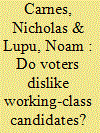|
|
|
Sort Order |
|
|
|
Items / Page
|
|
|
|
|
|
|
| Srl | Item |
| 1 |
ID:
134834


|
|
|
|
|
| Summary/Abstract |
Why would a national political party that has been competitive for decades collapse overnight? In recent years, parties across Latin America went from being major contenders for executive office to electoral irrelevance over the course of a single electoral cycle. The author develops an explanation that highlights the impact of elite actions on voter behavior. During the 1980s and 1990s leaders across the region implemented policies that were inconsistent with their traditional party brand, provoked internal party conflicts, and formed strange-bedfellow alliances with traditional rivals. These actions diluted the brands of their parties, eroding voters' partisan attachments. Without the assured support of partisans, parties become more susceptible to retrospective voting. Voters who now had no party attachments deserted incumbent parties when they performed poorly. The author tests this interactive hypothesis using matched comparisons of six party-election cases from Argentina and Venezuela.
|
|
|
|
|
|
|
|
|
|
|
|
|
|
|
|
| 2 |
ID:
149682


|
|
|
|
|
| Summary/Abstract |
In most democracies, lawmakers tend to be vastly better off than the citizens who elect them. Is that because voters prefer more affluent politicians over leaders from working-class backgrounds? In this article, we report the results of candidate choice experiments embedded in surveys in Britain, the United States, and Argentina. Using conjoint designs, we asked voters in these different contexts to choose between two hypothetical candidates, randomly varying several of the candidates’ personal characteristics, including whether they had worked in blue-collar or white-collar jobs. Contrary to the idea that voters prefer affluent politicians, the voters in our experiments viewed hypothetical candidates from the working class as equally qualified, more relatable, and just as likely to get their votes. Voters do not seem to be behind the shortage of working-class politicians. To the contrary, British, American, and Argentine voters seem perfectly willing to cast their ballots for working-class candidates.
|
|
|
|
|
|
|
|
|
|
|
|
|
|
|
|
| 3 |
ID:
110532


|
|
|
|
|
| Publication |
2011.
|
| Summary/Abstract |
Against the current consensus among comparative political economists, we argue that inequality matters for redistributive politics in advanced capitalist societies, but it is the structure of inequality, not the level of inequality, that matters. Our theory posits that middle-income voters will be inclined to ally with low-income voters and support redistributive policies when the distance between the middle and the poor is small relative to the distance between the middle and the rich. We test this proposition with data from 15 to 18 advanced democracies and find that both redistribution and nonelderly social spending increase as the dispersion of earnings in the upper half of the distribution increases relative to the dispersion of earnings in the lower half of the distribution. In addition, we present survey evidence on preferences for redistribution among middle-income voters that is consistent with our theory and regression results indicating that left parties are more likely to participate in government when the structure of inequality is characterized by skew.
|
|
|
|
|
|
|
|
|
|
|
|
|
|
|
|
|
|
|
|
|